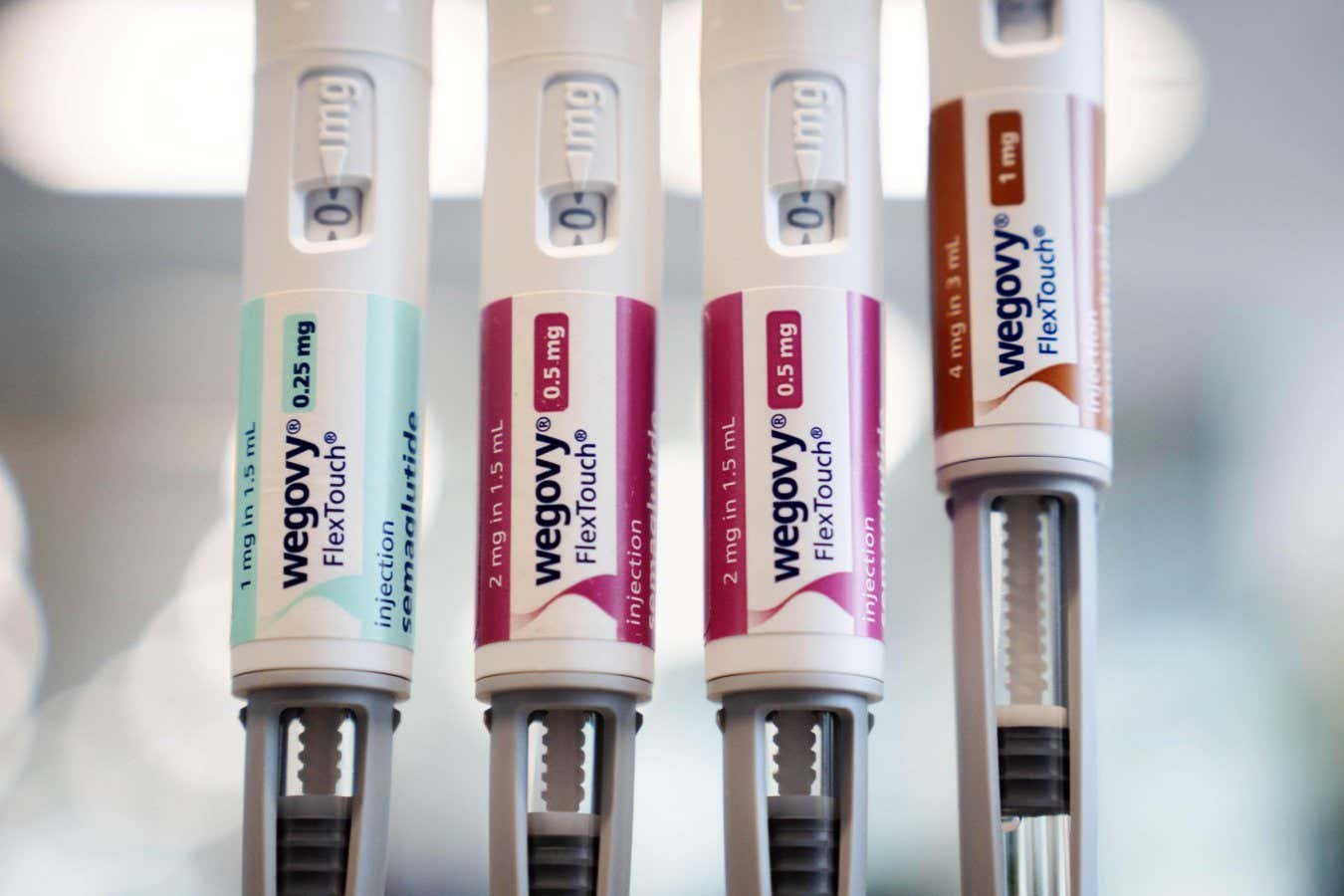Weekly Wegovy injections can help people lose weight
James Manning/Pa -Pictures/Alamy
A higher weekly dose of Wegovy achieves even greater weight loss than the standard, but this comes with a greater risk of side effects, according to experimental results.
Previous studies have people who get a standard weekly injection of Wegovy, which contains the active ingredient semaglutide, typically lose approx. 15 percent of their body weight over a year, which is combined with exercise and eating healthy. The drug works by mimicking the effect of the hormone lucagon-like peptide-1 or GLP1, which has several effects, such as slowing the stomach emptying and acting on the brain to reduce apptitite.
Wegovy, made by pharmaceutical company Novo Nordisk, is approved to treat people with obesity and those who are overweight and have at least one weight-related condition as type 2 diabetes. “But there are patients who Don respond so well or who respond well, but want to dare the typical weight loss of 10 to 15 percent,” says Lora Heisler at the University of Aberdeen, UK, who was not involved in the study.
To explore where up to dose could help, Sean Wharton recruited at the University of Toronto in Canada and his colleagues, including researchers at Novo Nordisk, more than 1000 adults with obesity in 11 countries, USA, Canada and Pars of Europe.
They randomly assigned the participants, none of whom had diabetes, to take a standard 2.4 milligrams of weekly injection of semaglutide – as found in Wegovy – a higher dose of 7.2 milligrams or a placebo injection. Those at Semaglutide were gradually driven up to their assigned dose over several weeks. All participants were also asked to eat 500 fewer calories a day and perform 150 minutes of training a week.
A year later, on the standard dose, they lost 16 percent of their body weight on average, while the high dose group lost about 19 percent. In contrast, the placebo group lost approx. 4 percent of their body weight.
One -third of them in the standard dose group experienced weight loss of 20 percent or more, while this happened in almost half of those who got the higher dose. Only 3 pr. Hundreds of the placebo group achieved this level of weight loss. This suggests that a higher dose leads to significant improvises in weight loss, says Heisler.
At the beginning of the trial, more than a third of participants in each group of prediabetes had a condition where blood sugar levels are higher than average but not high enough to indicate type 2 diabetes. But at the end of the study, there were 83 percent fewer cases in the high -dose group and 74 percent fewer among those on the standard dose. “It’s really positive, because of race, the purpose of weight loss is to improve health,” says Heisler.
But there are disadvantages. While 61 percent of them on the standard dose experienced intestinal -related side effects such as nausea, vomiting and diarrhea, this happened in 71 percent of them on a higher dose. Meanwhile, 40 per Hundreds of them, we placebo, the same symptoms. That’s because people may have such symptoms of reasons not associated with treatment, says Heisler.
Furthermore, more than a fifth of those in the higher dose group experienced unpleasant and painful skin feelings known as dythesia. As a result, the treatment participants were interrupted. In contrast, only 6 percent of those who received the standard dose and only one person on placebo had this side effect, of which no one stopped the treatment.
Together, the conclusions suggest that the benefits of taking a higher dose can offset the risk of some people, says Heisler. “For a patient who needs to achieve more weight loss and not experience many side effects, maybe the higher dose will help them get there,” she says. But it can be an unsuitable for those who lose enough on the standard dose or experience worse side effects, she says. She adds that she would like to see further trials confirm the results before it is B3RA to the clinic.
In a separate trial, Wharon and his colleagues found early evidence that a higher dose also enables greater weight and improvements in blood sugar levels among people with both obesity and type 2 diabetes. But the results were not statistically meaningful, which means that further attempts are needed to confirm this, says Simon Cork at Anglia Ruskin University, UK.
Topics:
- Obesity/
- Weight Loss Medicine
